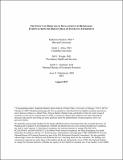| dc.contributor.author | Baicker, Katherine | |
| dc.contributor.author | Allen, Heidi L. | |
| dc.contributor.author | Wright, Bill J. | |
| dc.contributor.author | Taubman, Sarah L. | |
| dc.contributor.author | Finkelstein, Amy | |
| dc.date.accessioned | 2020-01-27T19:55:45Z | |
| dc.date.available | 2020-01-27T19:55:45Z | |
| dc.date.issued | 2018-03 | |
| dc.identifier.issn | 0887-378X | |
| dc.identifier.uri | https://hdl.handle.net/1721.1/123683 | |
| dc.description.abstract | Context
Expanding Medicaid to previously uninsured adults has been shown to increase detection and reduce the prevalence of depression, but the ways that Medicaid affects mental health care, how effectively it addresses unmet needs, and how those effects differ for those with and without a history of depression remain unclear.
Methods
We take advantage of Oregon's Medicaid lottery to gauge the causal effects of Medicaid coverage using a randomized‐controlled design, drawing on both primary and administrative data sources.
Findings
Medicaid coverage reduced the prevalence of undiagnosed depression by almost 50% and untreated depression by more than 60%. It increased use of medications frequently prescribed to treat depression and related mental health conditions and reduced the share of respondents reporting unmet mental health care needs by almost 40%. The share of respondents screening positive for depression dropped by 9.2 percentage points overall, and by 13.1 for those with preexisting depression diagnoses, with greatest relief in symptoms seen primarily in feeling down or hopeless, feeling tired, and trouble sleeping—consistent with the increase observed not just in medications targeting depression but also in those targeting sleep.
Conclusions
Medicaid coverage had significant effects on the diagnosis, treatment, and outcomes of a population with substantial unmet mental health needs. Coverage increased access to care, reduced the prevalence of untreated and undiagnosed depression, and substantially improved the symptoms of depression. There are likely to be substantial mental health consequences of policy decisions about Medicaid coverage for vulnerable populations.
Keywords: Medicaid; insurance; depression; mental health | en_US |
| dc.description.sponsorship | National Institute on Aging (Grant P30AG012810) | en_US |
| dc.description.sponsorship | National Institute on Aging (Grant RC2AGO36631) | en_US |
| dc.description.sponsorship | National Institute on Aging (Grant R01AG0345151) | en_US |
| dc.description.sponsorship | National Bureau of Economic Research (Grant 5 RRC 08098400‐03‐00) | en_US |
| dc.publisher | Wiley | en_US |
| dc.relation.isversionof | http://dx.doi.org/10.1111/1468-0009.12311 | en_US |
| dc.rights | Creative Commons Attribution-Noncommercial-Share Alike | en_US |
| dc.rights.uri | http://creativecommons.org/licenses/by-nc-sa/4.0/ | en_US |
| dc.source | Prof. Finkelstein via Nick Albaugh | en_US |
| dc.title | The Effect of Medicaid on Management of Depression: Evidence From the Oregon Health Insurance Experiment | en_US |
| dc.title.alternative | The Effect of Medicaid on Management of Depression | en_US |
| dc.type | Article | en_US |
| dc.identifier.citation | Becker, Katherine et al. "The Effect of Medicaid on Management of Depression: Evidence From the Oregon Health Insurance Experiement." The Milbank Quarterly 96 ,1 (March 2018): 29-56 © 2018 Milbank Memorial Fund | en_US |
| dc.contributor.department | Massachusetts Institute of Technology. Department of Economics | |
| dc.relation.journal | Milbank Quarterly | en_US |
| dc.eprint.version | Original manuscript | en_US |
| dc.type.uri | http://purl.org/eprint/type/JournalArticle | en_US |
| eprint.status | http://purl.org/eprint/status/NonPeerReviewed | en_US |
| dspace.date.submission | 2019-12-17T15:30:44Z | |
| mit.journal.volume | 96 | en_US |
| mit.journal.issue | 1 | en_US |
| mit.metadata.status | Complete | |
